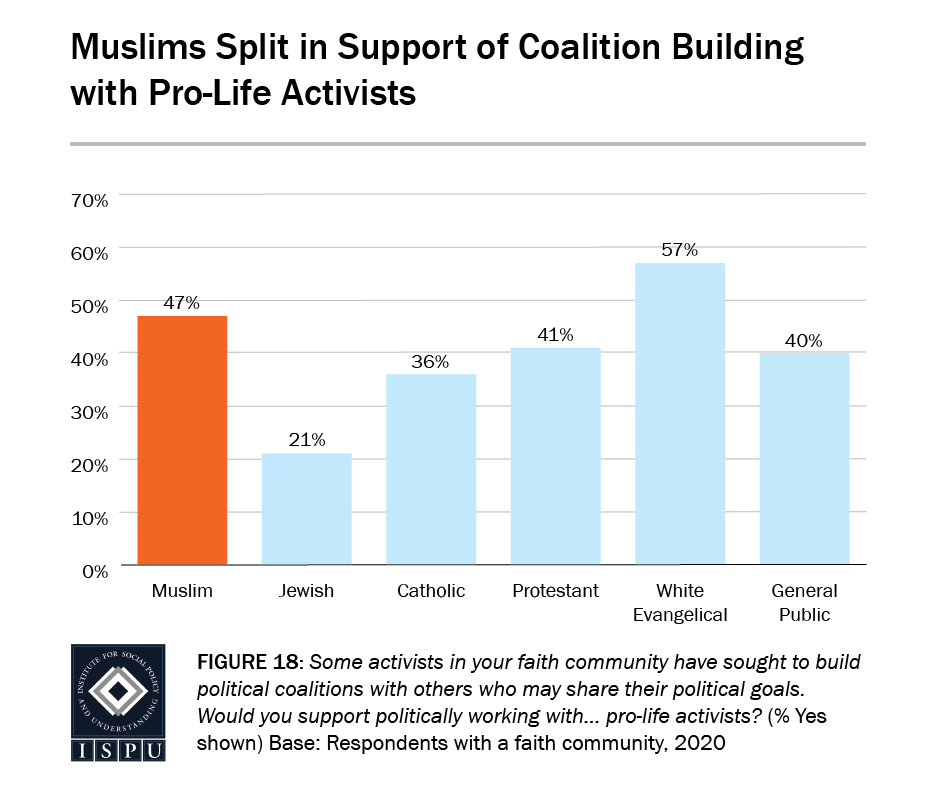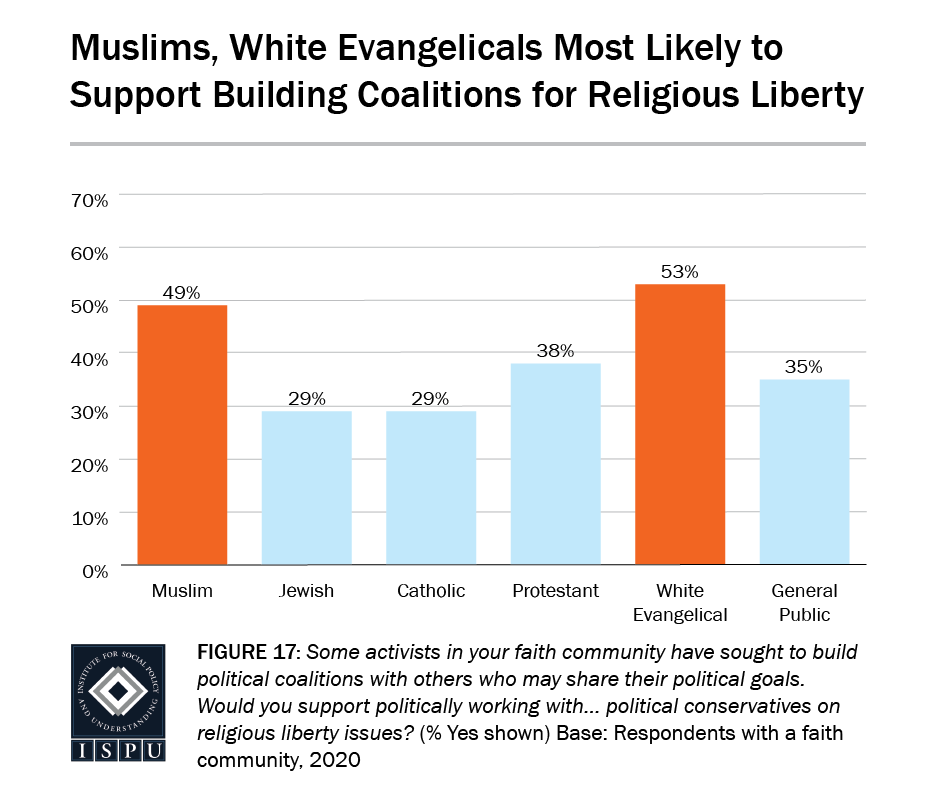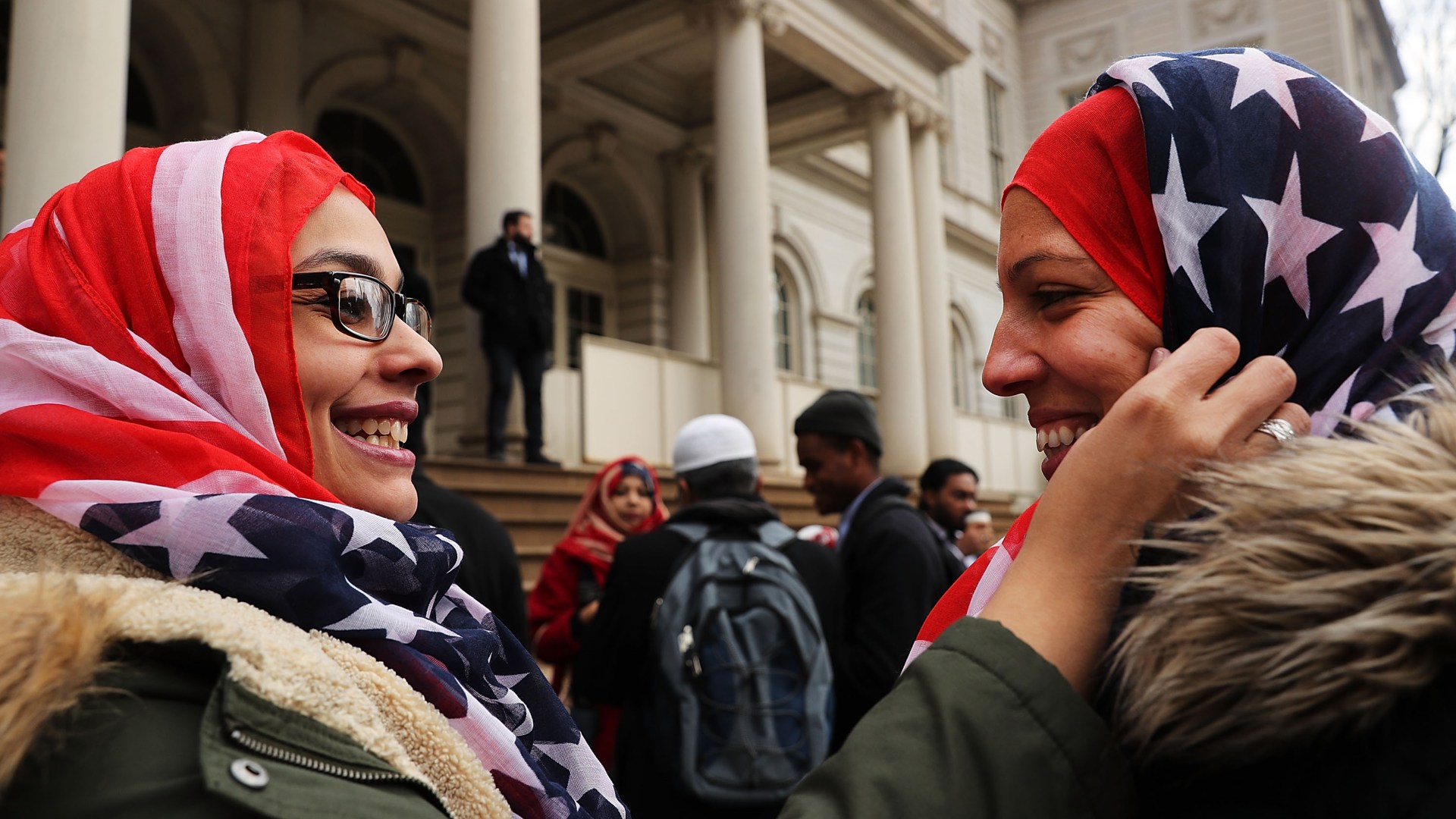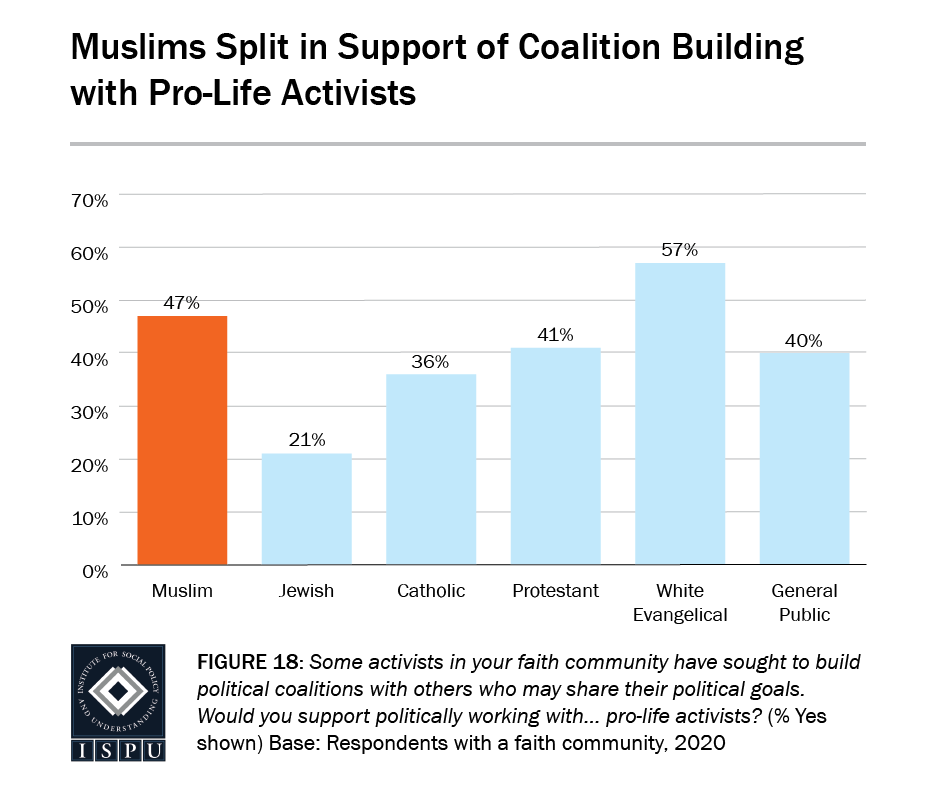In a tightly contested presidential race, might Muslims swing the US election?
Referencing the release of President Donald Trump’s tax returns in Tuesday’s debate, former vice president’s Joe Biden’s “inshallah” [Arabic for “if God wills”] may have been a nod to the strong support he receives from this community.
But according to data from the fifth annual American Muslim Poll, Muslims make up only 1 percent of the American population, only 74 percent are eligible to vote, and only 57 percent are registered.
Why then do they occupy such an outsized space in the mind of many American evangelicals? And what should evangelicals better understand about the American Muslim community and their political preferences?
CT spoke with Dalia Mogahed, director of research at the Institute for Social Policy and Understanding (ISPU), which commissioned the poll. Surveying 2,167 respondents—including more than 800 Muslims, 350 Jews, 200 Catholics, and 200 white evangelicals—ISPU aimed to showcase Muslim perspectives within the context of America’s landscape of faith.
Among the findings is that American Muslims disproportionately practice their politics at the local level. Over 1 in 5 has attended a town hall meeting (22%), compared to white evangelicals and the general public (12% vs. 15%).
And while only 27 percent of the general public reports satisfaction over the direction of the country, both Muslims (37%) and white evangelicals (42%) are more positive.
Are they satisfied with the same things?
CT and Mogahed discussed the social conservatism of many American Muslims, their willingness to build coalitions on pro-life and religious liberty issues, and the surprising numbers concerning their approval rating of President Trump.
The level of support for President Trump has doubled among Muslims, from 13 percent in 2018 and 16 percent in 2019 to 30 percent in 2020. How to you interpret this finding?
We are still trying to understand it ourselves. One thing is that this growth in support came primarily from white Muslims. They are about 20 percent of the community, but approved of Trump’s performance at 50 percent, on par with white Americans overall [48%]. Non-white Muslims were much lower [20–27%], on par with non-whites in the general public [16–24%]. So there is a salience of race in the Muslim community, just as there is in America overall.
The second thing that may have contributed to the uptick is the timing of the poll, which was right at the start of the lockdown, mid-March to mid-April. There may have been a sense of “rallying around the flag” as the president led the country at that time.
Your poll also examined the attitude of the Muslim community toward building coalitions with religious liberty and pro-life groups. Might some of this increase in support for the president be connected to his stand on these issues?
That also may have contributed. [Among] the variables linked to support for Trump is support for religious liberty, as is choosing the economy as the most important issue facing the government. Interestingly, just like the general public, identifying as white was also a predictor of support for the president; so again, race is a salient factor.
What was most surprising to me is that religiosity—all else being equal—was not a factor. But partisanship was.
So it doesn’t matter how pious Muslims are [71% said their faith was important to their daily life in last year’s survey], or how often they pray [43%]. These have no bearing on their political choices.
Exactly. As is the case of the general public.
Looking closely at the coalition building figures, roughly half of Muslims seem to be pro-life [49%], and roughly half support issues surrounding religious liberty [47%]. But the question is specifically about coalitions. How do you unpack these figures?
The question asked if you are in favor of building political coalitions with activists working on the cause in question. The community is split right in half, but this doesn’t necessarily mean that the other half is not pro-life or doesn’t care about religious liberty.
They may object for other reasons—if the activists have objectionable views about Muslims, or other issues—despite agreeing with them on abortion or religious liberty.

Are American Muslims pro-life? Do they favor restrictions on abortion? Or is abortion an unclear matter in Islamic teaching?
The question is difficult to answer. I’ve never seen data on what Muslims would say. Abortion is not as cut and dry as it may be for many evangelicals.
There is a difference over when the soul is breathed into the fetus’s life. Some say it is present at conception, while other legal scholars say it comes at 120 days of gestation. Some of the latter might say an abortion is allowed for specific reasons up until this 120-day mark.
But despite many Muslims being against an abortion for themselves, a minority would say they are wary of the government regulating it, because it opens the door to regulating other personal matters.
The community is very diverse in its views.
I think this would be a wonderful topic for a dialogue between Muslims and evangelicals. I was surprised the figures for coalition building were not higher for evangelicals in our poll [53% favorable for religious liberty coalitions, and 57% favorable for pro-life ones], as we give everyone the same questions.
The polls suggest Muslims suffer disproportionate religious discrimination [60%, compared to 33% of the general public]. So one might think they would be in favor of building coalitions in defense of religious liberty. Why is it that half of the community [47%] does not?
I would say half of Muslims see the solution to religious discrimination in terms of religious liberty—the first amendment. The other half would see the solution in civil rights laws.
This side is sometimes in conflict with religious liberty activism, which sees coalition building as a threat to their civil rights. If they don’t stick up for other groups who are discriminated against, their own rights won’t be respected.
The other side says no, we should be aligned with religious conservatives who want to give people the right to respect their faith and determine how to run their schools, churches, and mosques.
You really do have both sides in our community, in constant debate.

Is this tension reflected also in the finding that 55 percent of Muslims are not in support of building coalitions with LGBT groups?
Muslim-Americans are on par with Catholics [61%] and the general public [62%] in opposition to these coalitions. Those who approve them [39% of Muslims] may see common cause between Muslim issues and LGBT issues in terms of human rights.
How do Muslims interpret homosexuality within Islam?
This topic is much more cut and dry than abortion, and is not a debate within the body of Islamic jurisprudence in any way. The only sanctioned sexual activity is between a man and a woman in the context of marriage, anything else is considered a sin.
But I do want to clarify that in Islam, simply being a gay, lesbian, or bisexual is not a sin until it is acted upon. Islam draws the line between thoughts and actions, and gives rewards for self-restraint.
The debate is not about homosexual relations, but whether Muslim civil rights and religious liberty is protected by supporting other groups’ freedom to live their life as they choose.
This reminds me of last year’s survey, which polled Muslims on the degree to which they wanted their religious law to influence US legislation.
Some people within the Muslim, Christian [Catholics 28%, Protestants 39%], and certainly within the [white] evangelical community do favor their religious principles to inform law. But Muslims are less likely than evangelicals to favor a role for their faith in law [33% vs. 54%], and are on par with the general public.
The poll shows that American Muslims favor the Democratic candidate [51%] over the Republican candidate [16%]. But if Muslims are socially conservative on so many issues, why do they “lean left?”
Muslims are more socially conservative than the average American—in terms of how they see sexual morality, for instance.
However, there are many things central to the Muslim belief system that resonate with the Democratic party. One is care for the poor. Health care as something people should have access to, even if they can’t afford it. Protection of the environment. These social welfare issues align with Islam as well.
Another issue, frankly, is the alienation of Muslims from the Republican party, especially after 9/11 and the so-called “war on terror,” and their perceived Islamophobia. Perhaps more Muslims would identify as Republican if there wasn’t such a hostile rhetoric against them from important leaders within the party.
At a social level, last year’s poll showed a 33-percent favorable rating toward evangelicals, compared to a 14-percent unfavorable rating. Can you explain this positive opinion toward evangelicals?
Unfortunately, the opposite is not true. Evangelicals are much more likely to have negative opinions of Muslims [44% unfavorable vs. 20% favorable], so the view is not reciprocated.
Why are Muslims neutral to positive? Muslims tend to respect and admire religious devotion, and they tend to see evangelicals as people who take their faith seriously, and live according to its teaching.
As our country tends more and more toward religious non-affiliation and agnosticism or atheism, this is the ideology that Muslims feel threatened by, not Christianity.
While evangelicals are responsible for their own community attitudes, what are Muslims doing, or can do, to overcome these negative perceptions?
Muslims are doing a great deal. I know of several Muslim-evangelical interfaith activities. But the key thing that needs to happen is for evangelical leaders to see Muslims in a more accurate light. I’ve watched evangelical television, and I am horrified by the way they speak about our community—things that are simply not true.
I think a better understanding of our faith would go a long way, as it tends to completely transform the view of Muslims. I’ve seen this firsthand many times.
What have you heard evangelical leaders say in denigration?
I have heard people say that Muslims worship a false god, that their faith is based in demonic teachings. I’ve heard this directly and in person.
This is simply not true. Muslims worship the God of Abraham, the same God Christians and Jews claim to worship. We have a different concept of God—we do not believe in the Trinity—but to accuse Muslims of demonic worship is so baseless and almost laughable.
Satan is portrayed in the Quran as our enemy, as someone who rebelled against God. I encourage everyone to just read the Quran for themselves.
Within the evangelical community, the issue of “same God” is a theological concern, not just a case of popular rhetoric. But if religious differences cannot be set aside so easily, where do you see examples of Muslims and evangelicals working on issues of the common good?
I believe there is an anti-torture campaign these groups are involved in, believing in the dignity of human beings as endowed by their Creator. Poverty is another issue. These are two areas where we can work together, with the younger generation especially concerned about environmental protection.
We started with politics, so we can end with it also. Since many evangelicals are inclined to vote for President Trump, and it is expected to be a tight election, how can they convince Muslims to vote for their candidate of preference?
They would have to reassure Muslims that President Trump wouldn’t seek to harm their community, violate their rights, and sanction discrimination against them. That he would make an effort to lift the “Muslim ban.” I would emphasize the economy and religious liberty, things pro-Trump Muslims already agree with. These would be my talking points.
The poll shows that Muslim support for Republicans has held steady from 2016 to 2020 [at 16%]. But this year, only 51 percent said they prefer a Democrat, which is a significant decline from 67 percent in 2016. And 28 percent of Muslims said they were undecided.
Is there a sense that Muslims are not as solidly in the Democratic camp as they were before?
I think there has been some erosion, especially because of concerns for religious liberty. Whether this will lead them to vote for President Trump, or just stay home, remains to be seen.











